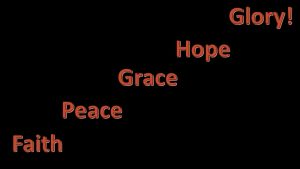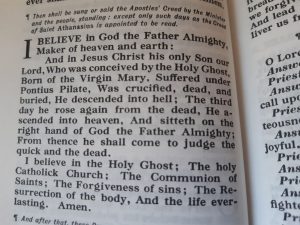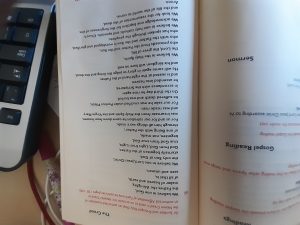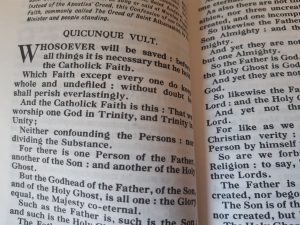Monthly Archives: June 2020
Trinity 2 – Rev Alison Way
Trinity 2 – In the name of God, Father, Son and Holy Spirit – Amen.
Link To Rev Alison Way video version. https://youtu.be/20ugZffZRvA
Link to Bishop Peter’s video for 21st June can be found here: https://www.bathandwells.org.uk/2020/06/livestreamed-services-and-reflection/
Romans 6:1b-11, Matthew 10:24-39
This week we are going to continue to look at what St Paul has to say in our lesson from Romans. It will probably help to have the text in front of you. It is Romans 6:1-11
Our passage today starts in an odd place with a question – What then are we to say?. This makes us think immediately what are we going to say about what? Abit like a moment when we walk in on a conversation and really want to know what was being said before we walked in the room!
In this letter – what Paul had been talking about before this was the grace of God making many righteous and bringing eternal life. We might be a bit scared of using that term righteousness. However, at its simplest through Jesus, God set us right, brought us in his kingdom with the promise of life everlasting. Through this act God opens his heart of love for us.
I think one of the reasons we are not comfortable with righteous is that it can be confused with Self-righteousness – which generally does not win friends or influence people and is pretty unattractive when we encounter it. Self-righteousness certainly won’t set us right with God.
Both Matthew’s gospel and our passage from Romans centre on righteousness being a gift through our faith in God’s love. Love shown in the saving acts of Jesus, which Paul goes on to talk about in this passage.
Let’s unpack this a bit more with the next thing Paul says… The supplementary question after – What then are we to say is – Should we continue to sin in order that grace may abound? It kind of sounds like if we sin (and God forgive us – with his grace abounding) – We make God look good. Aka us sinning is good for God’s reputation. Paul rapidly says this is not what I mean… and then in rather difficult language explains what he does mean.
We suffer abit here because we aren’t first century Roman Christians, the original recipients of this letter. Paul answers himself, as he often does, ‘By no means!’. Of course we should not continue to sin, because we have been baptized ‘into’ Christ (v.3). Paul continues to stress the close identification of each and every believer with Jesus Christ. As believers we are on a journey to becoming more like Jesus day by day. He uses aspects of Jesus story to identify with our journey using phrases such as ‘buried with him’ through baptism into death in v4. Then ‘united with him’ in death and resurrection (v.5), ‘crucified with him’ (v.6) and finally ‘live with him’ (v.8).
Following on from this deep sense of identification with the life and saving acts of Jesus and the freedom from slavery to sin this brings, Paul asks us to ‘consider yourselves dead to sin and alive to God in Christ Jesus’ Difficult as this is – let’s unpack those a bit more . What does this mean?
Let’s start with I am dead to sin – what does that mean? It means I recognise the power of the saving love of Jesus in my life. It means I have chosen to love God and live the way God says is best for me. It means I recognise the merciful forgiving nature of God and its power in my life, I know I am living in God’s kingdom now, living in his love and with his promise of love for eternity to rely on.
However I am dead to sin does not mean I am incapable of sinning. At times when I make wrong choices, and don’t do what I should or do what I shouldn’t. When this happens, I seek forgiveness of God, and forgiveness of those I may have hurt along the way. The principle at its simplest is that I know that repentance and seeking forgiveness, and being forgiving is the path to a life that is worth living and worthy of God’s love for me. Just to say – There are in life some very difficult circumstances when it is not as simple as that too.
Let’s move from that to I am alive to God in Christ Jesus. What a powerful phrase that is. This sentence reminded me of some teaching I heard from Timothy Ratcliffe some 11 years ago. It was about being fully alive in God. Timothy is a Roman Catholic priest and Dominican friar. He has written a number of books, but is particularly impressive teaching in person. For him being fully alive – being alive to God has three aspects
-
Being nurtured in the Christian faith in a way that helps us know and cherish ourselves and the gifts God has given us.
-
Working out our faith in how we live with one another, cherishing others we have to journey with.
-
Drawing others to faith and share the love that God has given us.
In short knowing ourselves as beloved children of God, having others to travel with to help us and being a channel of God’s love to us to others. Pretty good principles to live by, but he didn’t stop there. He said three things were absolutely essential to being alive to God in Christ Jesus and what he thought these were may surprise us!
Firstly – that our faith is active – it something we are actively engaged in – impacting our day to day lives. It engages our intellects but not just our intellects, it engages our hearts but not just our hearts, it engages all of us body, mind and spirit. It is not passive – or primarily about letting others do it for us.
Secondly, Faith is not just an individual thing – it really needs a community element. I am longing for the day when we can worship together and I can get to know you better face to face. I have really, really missed this element of our walk, especially in these early days of my time here. We need the encouragement and strengthening of our brothers and sisters in Christ. I am hugely grateful and thankful for all the phone support and social distanced practical support that has been going on.
Being a christian is something where fellowship is essential. It will be good when we get to the point where we can pray privately in our beautiful buildings, but even better when the day comes when we can pray together. That is going to present challenges, and for some in the most vulnerable groups this will not be advised for some time – which God will understand. It will not surprise you that as your rector – I think being a Christian and not belonging to a Church doesn’t make sense. I think taking this approach means we are missing out big time. The faith is not designed to be practiced in isolation from our fellowship. The church is also not the building but the people in it. We are the body of Christ here! our love of God, and our love of each other and each person is special, valued and essential.
The third essential is possibly the most surprising – it is Living light-heartedly and joyfully. Being free not to take ourselves too seriously. To gain confidence through believing together (as God intended it). Grow in love – having loving eyes for the beauty of people around us (and not judgemental ones). Tune into God’s playful creativity and to move away from the mechanical, cause and effect understanding of a world to a more organic and rooted understanding.
Let ourselves be touched by people’s experiences and have hearts of flesh (and not stone). The opposite of joyfulness Timothy Ratcliffe said is hardness of heart. I recognise in myself the need to step back and take a deep breath and look for the good and the joy. I have been finding the current situation pretty stressful. I am not particularly a fan of moving targets, and layers of changing guidance and if I am honest three versions of an important and essential risk assessment in less than a week pushes my buttons!!!
But there is a way through this and the love of God is steadfast and inspiring. Our gospel passage today – clearly pointed that the going is not always going to be straightforward. Challenges and conflicts will come along the way. The important thing is to stay in this moment now. To stay connected to the influence of the Holy Spirit, and look for the joy. An old habit of mine is to look at the end of each day for something to be thankful for and I am going to finish by asking you to think in the week ahead about how we can live our lives more joyfully even in our pandemic times. Echoing the sentiments of St Paul’s letter to the Romans – We are dead to sin and alive to God in Christ Jesus. Amen
References:
Fully Alive lent programme – 2009 – Salisbury Diocese Fr Timothy Ratcliffe
New Revised Standard Version Bible: Anglicised Edition, copyright © 1989, 1995
Trinity 1 – 14th June 2020 – Rev Alison Way
Video reflections: Rev Alison Way – https://youtu.be/6f135i-HfMw
Bishop Ruth – https://youtu.be/o1h9jrT9kLw
Romans 5:1-8 – Matthew 9:35-10:8 –
In the name of the Father, the Son and The Holy Spirit, Amen
Over the next few week’s we have as our first readings – passages from St Paul’s letter to the Romans. This is St Paul at his most developed, not always easy to understand, but flowing and in full voice! It may help as I am talking this morning to have the passage from Romans in front of us. It is chapter 5 verses 1 to 8
 Intriguingly the first 2 verses contain – Faith, peace, grace, hope and glory! All key concepts in understanding our Christian walk. Starting with the faith part of this – since we are justified by faith. We have been drawn into God’s promise for us through our acceptance of it. The work done in Jesus Christ. It says our faith is ongoing and it relates to the one time saving love of Jesus through the cross, but also our continuing trust in the promise of it – something that fires our walk of faith in God every day.
Intriguingly the first 2 verses contain – Faith, peace, grace, hope and glory! All key concepts in understanding our Christian walk. Starting with the faith part of this – since we are justified by faith. We have been drawn into God’s promise for us through our acceptance of it. The work done in Jesus Christ. It says our faith is ongoing and it relates to the one time saving love of Jesus through the cross, but also our continuing trust in the promise of it – something that fires our walk of faith in God every day.
The next bit is describing the consequences of walking in faith. We talked about this a lot last week – our experience of the peace of God. Paul’s original audience would have understood this peace, not just in militaristic terms or an absence of conflict but also in it meaning our total well being and harmony.
Speaking into the diverse and multicultural Roman church, this is also peace given by God which embraces all members of races and nations without distinction. Everyone is equal in the sight of God – and our love for other should mirror this. It has been hard to watch the recent events in the USA. Blatant racism has been called out. It must be called out. Prayers for justice are important and for hearts to change to value all equally all across our world.
Going back to our Romans’ passage Paul goes on to describe the grace in which we stand. Technically grace is unconditional love from God, love that is not merited. Paul Zahi explained this further
Grace is love that seeks you out when you have nothing to give in return. Grace is love coming at you that has nothing to do with you. Grace is being loved when you are unlovable…. The cliché definition of grace is “unconditional love.” It is a true cliché, for it is a good description of the thing.
Let’s go a little further, though. Grace is a love that has nothing to do with you, the beloved. It has everything and only to do with the lover. Grace is irrational in the sense that it has nothing to do with weights and measures. It has nothing to do with my intrinsic qualities or so-called “gifts” (whatever they may be). It reflects a decision on the part of the giver, the one who loves, in relation to the receiver, the one who is loved, that negates any qualifications the receiver may personally hold….
Grace is one-way love. So the giver here is God – There is nothing we can do to earn God’s love for us. God’s love is a given. So standing in grace is powerful.
Paul then finishes and we boast in our hope of sharing the glory of God. This is shouting from the roof top how great God is – not the more general uncomfortable understanding we have of ‘boasting’ today – which is not generally viewed as attractive or desirable. But we should not shy from the reassurance of life lived eternally in the heart of God that is central to our Christian faith. Knowing this hope has made the difficult days of 2020 easier to bear – and I have been concerned for how it might be for folk who live without this. All the more important, therefore, we take opportunities we have to share our faith in God and the hope it brings. Simple things like offering to pray for someone in our prayers and doing it are so important right now.
Around us near and far are people grieving the loss of loved ones – now over 40,000 in our country have died of Covid 19. Christian hope can shine a light in this that will bring comfort and peace. This is hope that rests entirely on God and his love for us.
Hope and glory are not the only things that Paul boasts of. Paul also boasts in his sufferings. Again something not top of our list to boast about! We know from his story – Paul did suffer significantly for his faith…
but we also boast in our sufferings, knowing that suffering produces endurance, and endurance produces character, and character produces hope, and hope does not disappoint us, because God’s love has been poured into our hearts through the Holy Spirit that has been given to us. (Romans 8:3-5)
Paul is really talking of character formation. The truth that we grow more in our faith in our trials and tribulations than we do when the going is good. For him suffering is not a contradiction to faith, or an occasion to renounce God, but is a strengthening of patience, maturing of character, and stimulating hope and gives more room for the Holy Spirit to work in us. In The Message which is a modern paraphrase of the bible these verses are rendered.
There’s more to come: We continue to shout our praise even when we’re hemmed in with troubles, because we know how troubles can develop passionate patience in us, and how that patience in turn forges the tempered steel of virtue, keeping us alert for whatever God will do next. In alert expectancy such as this, we’re never left feeling shortchanged. Quite the contrary—we can’t round up enough containers to hold everything God generously pours into our lives through the Holy Spirit!
The Holy Spirit gives us what we need for difficult days as well as good ones. That imagery of God’s love being poured into our hearts through the Holy Spirit is important, this is the overflowing, intimate and lavish love of God. My experience of this – is that when we look back on things we do see how God has been at work in our hearts and lives. Even in our most difficult times and sometimes because we have been more open in our most difficult times, because we give God more control and don’t let our own wills and desires get in the way.
I read in a commentary that the way the Holy Spirit works is a hidden dynamo of divine vitality which maintains the glow of love in us. I don’t have much experience of dynamos except those that power bicycle lights of old. But the inner workings of the Spirit in our inner workings are so important to our Christian growth. A hidden channel through which the love of God sustains us. Giving us the strength we need for today – lived in hope for tomorrow and the glory we will one day share.
The final part of this reading – reminds us how God loves us and what he did for us by sending his Son for us. It finishes God proves his love for us in that while we were still sinners Christ died for us. It takes us back too to where we started
We can do nothing to earn or deserve God’s amazing love for us. What we can do is love God in return and follow his path. On that path – the going may be easy, the going may be tough, but the power of the Spirit will work on us from the inside.
-
Be open and filled with God’s peace.
-
Know the grace of God in which we stand.
-
Share the hope we live by
-
And the glory we will one day share
-
-
-
End with a prayer a silence and a prayer
SILENCE
Creator God, we thank you that your amazing unfathomable love has been poured out for us at the cross of Jesus and poured into us by the Holy Spirit. Help us to walk by faith every day. Help us to endure in suffering when it comes. Help us know your peace and grace deep within. Pour your love into our hearts, in increasing measure by the power of your Holy Spirit, through Jesus Christ our Lord. It is in his name that we pray, Amen.
References:
The Message (MSG)Copyright © 1993, 2002, 2018 by Eugene H. Peterson
New Revised Standard Version Bible: Anglicised Edition, copyright © 1989, 1995
Paul Zahi quote from the internet – sorry I haven’t been able to find it again!
Trinity Sunday – Rev Alison Way
2 Corinthians 13:1-11 and Matthew 28:16-20
Link to Video Reflection by Alison Way https://youtu.be/Y5qKTlJpMPM
Link Video to Reflection by Bishop Peter https://youtu.be/oBpOpp2wL3Q
Trinity Sunday – 2 Corinthians 13:11-end, Matthew 28:16-20
In the name of God, father son and holy spirit- Amen
That line I have just said is so familiar that we tend to forget how important it is. It describes the 3 aspects of God, the 3 persons of what is a churchy word – the three persons of the trinity. Where God is our father and creator, Jesus is the son, who saved us, and the Holy spirit is the presence of God within us to help us and sustain us.
These are three things all mixed up together – all essential to the whole, and all making up the whole. To help us think about this all this– the concept of God as Trinity I want to start by thinking about one of these the humble mars bar.
Here’s one all wrapped up and here’s one I cut in half earlier – So we can see that like the Trinity there are three parts of a mars bar.
-
First there is the chocolate round the outside
-
Second there is the gooey caramel layer
-
Finally then a layer nougat which gives structure and substance.
To make a Mars, it works the other way round – you start with the nougat, put the caramel on top and then cover it with chocolate!! Okay I want us to think about eating a mars bar now. I appreciate it is probably a bit early for a seriously sugary snack – but please humour me. We could probably just eat the chocolate, without touching the other parts. Gentling nibbling the chocolate off the outside – (as a child I used to be rather fond of eating club biscuits like that!). But it would be very difficult to avoid getting a little bit of the nougat or the caramel with it!!!
Now what about if I asked you to just eat the caramel or the nougat without touching the other parts. That’s a bit more difficult! I could possibly manage it with a knife and a lot of effort, but without that pretty impossible. And in a way this mars bar is showing us how difficult it is to separate the layers from one another – As it is designed to all be eaten together.
And so it is with God – there are many layers to God – as Father, the Son and the Holy Spirit – And we are not designed to separate them either. But understand them as part of the whole. If you understand the chocolate as the Holy Spirit – God’s presence with us day by day. That’s the way in to understanding our spiritual dimension of our lives – our way of connecting with God the Father and his Son. We access Jesus through the power of the Spirit (or the chocolate in my mars bar thoughts). The caramel being Jesus and the nougat being God the Father are who we experience through the chocolate of the Holy Spirit – Inseparable from each other, the son relying on the creative substance of the Father – with the caramel layer on top of the nougat.
It may surprise you to realise this understanding of how God as Father, Son and Holy Spirit is very rarely brought together in our Bibles. The end of our reading from 2 Corinthians 13 is one of the very few places that bring this together. This is the Biblical basis of the words of the grace we use frequently today. I do think it is surprising that something so important to us is so sparcely present in scripture. One of the other places it is brought together like this is about baptising in our reading from Matthew’s gospel, in the great commission Jesus instructing us to baptise as we do in the name of the Father, of the Son and of the Holy Spirit..
Having established the idea of the Trinity is not particularly Biblical in origin, it is wisdom brought to us over the years through the development of the early Church. In fact the history at this point is quite entertaining, with disagreements and power struggles and a lot of human nature, with which we are well versed from our day. Differences of opinion in the Church have been very common from the earliest days.
I think it is interesting – if again possibly surprising that the statements of faith we routinely use – things we would call our creeds also come from so long ago.
 The Apostle’s creed is the simplest and the earliest formed around 150 years after Jesus birth. It was a response to a need to write things down and agree what Christians believe. This is the one we often say in services of morning or evening prayer in our Church, and begins I believe
The Apostle’s creed is the simplest and the earliest formed around 150 years after Jesus birth. It was a response to a need to write things down and agree what Christians believe. This is the one we often say in services of morning or evening prayer in our Church, and begins I believe
The Nicene creed we know was finished around 425 years after Jesus birth. It  took 125 years editing and discussion to reach the version we would recognise from a communion service in our Church, and begins We believe
took 125 years editing and discussion to reach the version we would recognise from a communion service in our Church, and begins We believe
There is another creed that comes in between those 2 in history and is in the book of Common Prayer – particularly recommended for Trinity Sunday (and some other festivals). Had I been leading a Book of Common Prayer service today, I would have got us to say it I wonder if anyone hearing this has ever grappled with it!! Please don’t worry if the answer to this is No! – I have been teaching Church History on a course for people thinking about ministry in many different forms for the last few years – and they had never heard of it either.
 It is commonly called the creed of St Athanasius – a key character in the wrangling about how to describe God I have previously described. In a moment there will be an opportunity to say it with me. It has never been updated to more modern language which again has diminished the number of times it is used.
It is commonly called the creed of St Athanasius – a key character in the wrangling about how to describe God I have previously described. In a moment there will be an opportunity to say it with me. It has never been updated to more modern language which again has diminished the number of times it is used.
I will pop up at the end and say a little more about it and our readings, so when we get to the end of the creed please don’t stop the video!!
Quicunque Vult
Whosoever will be saved: before all things it is necessary that he hold the Catholick Faith.
Which Faith except every one do keep whole and undefiled: without doubt he shall perish everlastingly.
And the Catholick Faith is this: That we worship one God in Trinity, and Trinity in Unity;
Neither confounding the Persons: nor dividing the Substance.
For there is one Person of the Father, another of the Son: and another of the Holy Ghost.
But the Godhead of the Father, of the Son, and of the Holy Ghost, is all one: the Glory equal, the Majesty co-eternal.
Such as the Father is, such is the Son: and such is the Holy Ghost.
The Father uncreate, the Son uncreate: and the Holy Ghost uncreate.
The Father incomprehensible, the Son incomprehensible: and the Holy Ghost incomprehensible.
The Father eternal, the Son eternal: and the Holy Ghost eternal.
And yet they are not three eternals: but one eternal.
As also there are not three incomprehensibles, nor three uncreated: but one uncreated, and one incomprehensible.
So likewise the Father is Almighty, the Son Almighty: and the Holy Ghost Almighty.
And yet they are not three Almighties: but one Almighty.
So the Father is God, the Son is God: and the Holy Ghost is God.
And yet they are not three Gods: but one God.
So likewise the Father is Lord, the Son Lord: and the Holy Ghost Lord.
And yet not three Lords: but one Lord.
For like as we are compelled by the Christian verity: to acknowledge every Person by himself to be God and Lord;
So are we forbidden by the Catholick Religion: to say there be three Gods, or three Lords.
The Father is made of none: neither created, nor begotten.
The Son is of the Father alone: not made, nor created, but begotten.
The Holy Ghost is of the Father and of the Son: neither made, nor created, nor begotten, but proceeding.
So there is one Father, not three Fathers; one Son, not three Sons: one Holy Ghost, not three Holy Ghosts.
And in this Trinity none is afore, or after other: none is greater, or less than another;
But the whole three Persons are co-eternal together: and co-equal.
So that in all things, as is aforesaid: the Unity in Trinity, and the Trinity in Unity is to be worshipped.
He therefore that will be saved: must thus think of the Trinity.
Furthermore it is necessary to everlasting salvation: that he also believe rightly the Incarnation of our Lord Jesus Christ.
For the right Faith is that we believe and confess: that our Lord Jesus Christ, the Son of God, is God and Man;
God, of the Substance of the Father, begotten before the worlds: and Man, of the Substance of his Mother, born in the world;
Perfect God, and Perfect Man: of a reasonable soul and human flesh subsisting;
Equal to the Father, as touching his Godhead: and inferior to the Father, as touching his Manhood.
Who although he be God and Man: yet he is not two, but one Christ;
One, not by conversion of the Godhead into flesh: but by taking of the Manhood into God;
One altogether, not by confusion of Substance: but by unity of Person.
For as the reasonable soul and flesh is one man: so God and Man is one Christ.
Who suffered for our salvation: descended into hell, rose again the third day from the dead.
He ascended into heaven, he sitteth on the right hand of the Father, God Almighty: from whence he shall come to judge the quick and the dead.
At whose coming all men shall rise again with their bodies: and shall give account for their own works.
And they that have done good shall go into life everlasting: and they that have done evil into everlasting fire.
This is the Catholick Faith: which except a man believe faithfully, he cannot be saved.
Glory be to the Father, and to the Son: and to the Holy Ghost;
As it was in the beginning, is now, and ever shall be: world without end. Amen.
So there you have it – the Athanasian creed, in short, it contains a more complete description of the Trinity in all its wonder and mystery and it doesn’t mince on the difficulty we have in understanding the interrelationships between God the Father, God the Son and God as Holy Ghost, and as we have said it we will probably said more incomprehensibles and uncreated than we have said all year!!
The Athanasian creed is a human attempt, with some technical and difficult language but a pretty comprehensive attempt to pin it all down and explain it – but it is limited by our humanness! One of the things it most helpfully does is that it serves to help us realise that we don’t understand and perhaps in this life that we never will understand fully how God is. Because there is always more too it, more layers and more complexity to grasp. Many of our attempts to define God put false limits in place, to what human minds can conceive and hold on to. There is always more to this and more and then yet more. We are linear which also makes our understanding partial, God is the same, yesterday, today and forever. It is as the creed so repeatedly puts it – uncreate and incomprehensible – Where as we are time limited as created beings to what is created and what we can comprehend
There is no way to define clearly what God is all about. Thank goodness defining where God is concerned really isn’t our role, loving worshipping and serving God is…
I think St Paul in our first reading today puts into context what our loving, worshipping and serving of God should look like in response to God’s amazing love for us as creator, redeemer and sustainer. In Verse 11 it says three things that I think are particularly important for us today.
Firstly put things in order – Get our priorities straight – love God and love our neighbour, God’s will and God’s kingdom not ours.
Secondly Listen to my appeal – pay attention and live by the wisdom and guidance of the scripture, and of the Holy Spirit in our lives. Be loving, be kind – so important in times like ours.
And finally Live in peace – be a peacemaker, a peacebringer and as the prayer of St Francis has it – make me a channel of your peace.
In our Christian faith is a wealth of peace that we know through God’s presence with us. Peace that has been guarding, guiding and inspiring us in these lockdown days. For me this has been peace that has been essential to our well-being. We have all had wobbly days I suspect, but God’s peace is a steading force to help us through the Holy Spirit with us.
Behind the scenes we are looking at how, when and in what ways we can use our buildings moving forward, and I am very grateful for the teams in both Wincanton and Pen Selwood who are helping with this. We are reliant on the National Church and our diocese for guidance on this matter. I am now also very conscious that this is not an easy task, and that there are layers of guidance, risk assessments and practical tasks to wade through. There will be difficult choices to make in this and for all of us one way or another. And what we can do, when we can will look different from how it has done up to this point. We really need to stay well connected with the peace of God over this and how best to proceed so we can worship together our God as Trinity – Creator, Redeemer and Sustainer. Connecting with this peace, the peace of God that is beyond our understanding, is what matters in all of this.
I am going to end with some hymn words – another of my many favourites – which if we were singing we would probably have sung today today. This is excerpt from St Patrick’s breastplate. I am going to put the words on the screen so you can say them with me if you wish.
I bind unto myself today
the power of God to hold and lead,
God’s eye to watch, God’s might to stay,
God’s ear to hearken to my need,
the wisdom of my God to teach,
God’s hand to guide, God’s shield to ward,
the word of God to give me speech,
God’s heavenly host to be my guard.
5 Christ be with me, Christ within me,
Christ behind me, Christ before me,
Christ beside me, Christ to win me,
Christ to comfort and restore me.
Christ beneath me, Christ above me,
Christ in quiet, Christ in danger,
Christ in hearts of all that love me,
Christ in mouth of friend and stranger.
6 I bind unto myself the name,
the strong name of the Trinity
by invocation of the same,
the Three in One and One in Three,
of whom all nature has creation,
eternal Father, Spirit, Word.
Praise to the Lord of my salvation;
salvation is of Christ the Lord! AMEN
References: Text from The Book of Common Prayer, the rights in which are vested in the Crown – is reproduced by permission of the Crown’s Patentee, Cambridge University Press.
Hymn words via CCLI 217043
New Revised Standard Version Bible: Anglicised Edition, copyright © 1989, 1995


